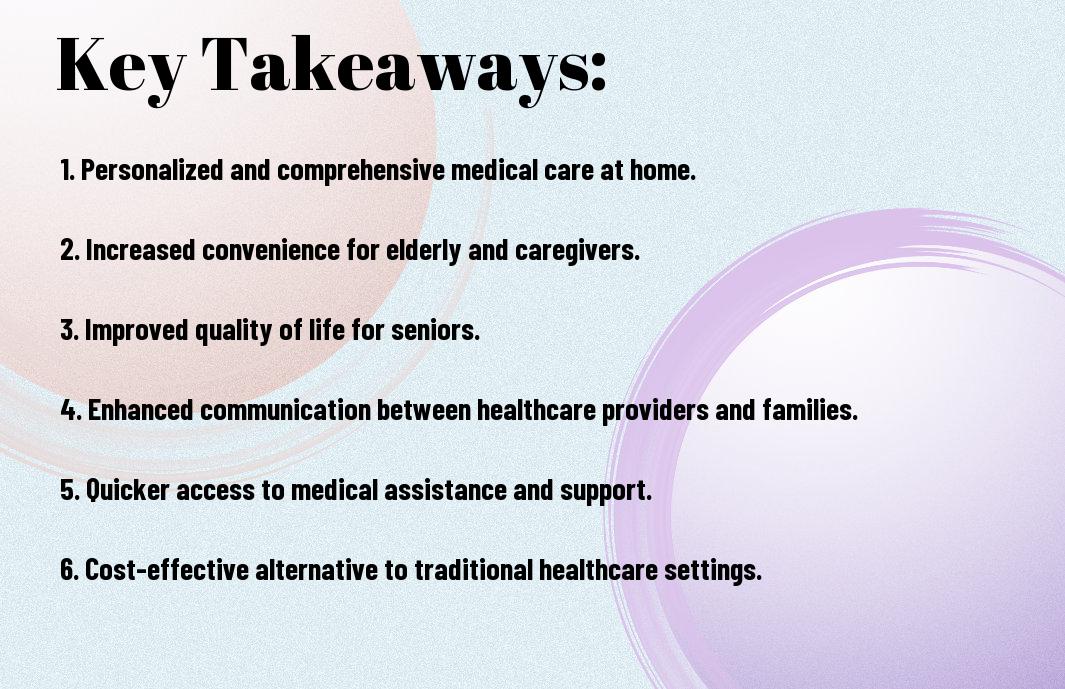
With aging populations on the rise, exploring the advantages of in-home primary care for the elderly is paramount. Discovering how this tailored approach enhances health outcomes and quality of life is crucial. Dive into the 5 Benefits of Home-Based Primary Care to grasp the profound impact and intricacies of this innovative healthcare model.
Key Takeaways:
- Enhanced comfort and convenience: In-home primary care provides elderly patients with the comfort of familiar surroundings and eliminates the need for stressful trips to the doctor’s office.
- Personalized and dedicated care: The personalized attention from in-home primary care providers allows for tailored treatment plans and more comprehensive care for elderly patients.
- Improved health outcomes: Studies have shown that in-home primary care for the elderly can lead to better management of chronic conditions, reduced hospital readmissions, and overall improved health outcomes.


Improved Health Outcomes
Personalized Care and Treatment
For elderly individuals, personalized care and treatment can make a significant difference in their health outcomes. In-home primary care allows healthcare providers to develop a deep understanding of the patient’s medical history, lifestyle, and individual needs. This personalized approach enables doctors to create tailored treatment plans that cater specifically to the elderly person’s requirements, ultimately leading to improved health outcomes.
Reduced Risk of Hospital-Acquired Infections
With in-home primary care, elderly individuals benefit from a reduced risk of hospital-acquired infections. Hospitals can be breeding grounds for dangerous bacteria and viruses, especially for older adults with weakened immune systems. By receiving medical care in the comfort of their own homes, seniors are less exposed to potential infections, leading to better overall health and well-being.
It is well-documented that hospital-acquired infections can be life-threatening for elderly patients. The risk of contracting infections such as MRSA or C. difficile is significantly higher in hospital settings. In-home primary care helps mitigate this risk, ensuring that elderly individuals can receive necessary medical treatment without being exposed to these dangerous pathogens.
Enhanced Comfort and Convenience
There’s a unique comfort that comes with receiving primary care services in the familiar environment of one’s own home. For elderly individuals, especially those with mobility issues or chronic conditions, the ability to have healthcare providers come to them can reduce stress and promote a sense of security. It eliminates the need for arduous trips to a clinic or hospital, making the overall healthcare experience more comfortable and convenient.
Familiar Environment and Reduced Stress
With primary care services provided in the familiar surroundings of their home, elderly patients can feel more at ease during medical appointments. The reduced stress of not having to navigate through traffic or sit in crowded waiting rooms can positively impact their overall well-being. Additionally, being in a familiar environment can help healthcare providers better understand the patient’s lifestyle and daily challenges, leading to more personalized and effective care.
Flexibility in Scheduling and Care Plans
Familiar with the flexibility in scheduling appointments and tailoring care plans to individual needs, in-home primary care offers a level of convenience that traditional healthcare settings may not provide. Patients and their families can work closely with healthcare providers to create a care plan that fits their specific preferences and requirements. This tailored approach can lead to better health outcomes and improved quality of life for elderly patients.
Increased Independence and Autonomy
Not all elderly individuals require round-the-clock care in a nursing home or assisted living facility. In-home primary care services offer a more personalized approach that promotes independence and autonomy for seniors.
Encouraging Self-Care and Empowerment
Any elderly person would appreciate the opportunity to take charge of their own health and well-being. In-home primary care providers work closely with seniors to develop personalized care plans that focus on self-care activities, empowering them to manage their health proactively. This approach fosters a sense of control and confidence in their abilities, leading to improved overall quality of life.
Maintaining Daily Routines and Activities
On a daily basis, many seniors have established routines and activities that are important for their mental and physical well-being. Home-based care allows elderly individuals to maintain these routines in familiar surroundings, which can be beneficial for their emotional health and cognitive function. Whether it’s having meals at a certain time, engaging in hobbies, or taking a daily walk, in-home primary care providers support seniors in continuing with their cherished activities.
To ensure the safety and well-being of seniors, in-home care providers also assist with activities of daily living, such as bathing, grooming, and medication management. By having these tasks taken care of in the comfort of their own home, elderly individuals can maintain a sense of normalcy and independence while receiving the necessary support to stay healthy and happy.
Better Management of Chronic Conditions
For elderly individuals with chronic conditions, in-home primary care offers several advantages in the management of their health. One of the key benefits is the ability to receive ongoing monitoring and adjustments to their treatment plans.
Ongoing Monitoring and Adjustments
Management: In-home primary care providers can regularly monitor the health status of elderly patients and make necessary adjustments to their medication regimens or treatment plans. This proactive approach helps to ensure that any changes in the patient’s condition are addressed promptly, leading to better overall health outcomes.
Reduced Risk of Complications and Exacerbations
Chronic conditions such as diabetes, heart disease, and arthritis require consistent monitoring and management to prevent complications and exacerbations. With in-home primary care, elderly patients can benefit from regular check-ups and preventative care measures that help reduce the risk of serious health issues.
Complications: By having a dedicated primary care provider who is familiar with their medical history and individual needs, elderly patients are less likely to experience complications related to their chronic conditions. This personalized approach to healthcare can result in fewer hospitalizations and a better quality of life for older adults.

Stronger Family Bonds and Social Connections
Once again, in-home primary care for elderly individuals offers numerous benefits beyond just medical treatment. One significant advantage is the opportunity to strengthen family bonds and enhance social connections, ultimately leading to improved overall well-being.
Involving Family Members in Care Plans
The involvement of family members in the care of elderly loved ones can significantly impact their quality of life. In-home primary care allows family members to actively participate in the care plans of their loved ones, fostering closer relationships and a sense of unity. By being actively involved in decision-making processes and care routines, family members can provide emotional support and ensure that their loved ones receive personalized and attentive care.
Reducing Feelings of Isolation and Loneliness
The sense of isolation and loneliness is a prevalent issue among the elderly population, especially for those who live alone or have limited social interactions. In-home primary care can help alleviate these feelings by providing regular visits from healthcare providers who not only attend to medical needs but also offer companionship and emotional support. Reducing isolation and loneliness can have a profound impact on the mental and emotional well-being of elderly individuals, leading to a positive outlook on life and improved overall health.
What are the Benefits of In-Home Primary Care for Elderly Patients?
Inhome primary care for elderly provides personalized attention and convenient medical services for seniors in the comfort of their own homes. This type of care promotes independence, reduces the risk of hospitalization, and ensures continuity of care for elderly patients with chronic conditions.
Cost-Effective and Efficient Care
Unlike traditional healthcare models, in-home primary care offers a cost-effective and efficient solution for elderly patients. To learn more about the benefits of in-home primary care, check out this insightful article on 6 Benefits of In-Home Primary Care for Seniors.
Reduced Healthcare Expenses and Hospitalizations
To start, in-home primary care can lead to reduced healthcare expenses and hospitalizations for elderly individuals. By providing proactive and preventive care in the comfort of the patient’s home, healthcare professionals can address issues before they escalate, potentially avoiding costly emergency room visits or hospital stays, which can strain both the patient and their family financially.
Streamlined Communication and Coordination
Expenses associated with healthcare often extend beyond medical bills to include time and effort spent on administrative tasks, such as scheduling appointments and coordinating care between different providers. With in-home primary care, there is a more cohesive and streamlined approach to communication and coordination between the patient, caregivers, and healthcare team.
With the healthcare team coming directly to the patient’s home, they can observe firsthand the living environment and any potential challenges that may impact the patient’s health. This direct observation allows for more personalized and holistic care, leading to better health outcomes and potentially reducing the need for unnecessary medical interventions.
To wrap up
Presently, in-home primary care for the elderly presents numerous benefits that greatly enhance the quality of life for seniors. By providing personalized and convenient medical attention in a familiar and comfortable environment, seniors can experience better health outcomes and improved well-being. Additionally, the emphasis on preventive care and early detection of health issues ensures that potential problems are addressed promptly, leading to better health management and reduced hospital admissions.
In the final consideration, the benefits of in-home primary care for the elderly extend beyond just medical treatment. It also encompasses emotional support, companionship, and a sense of independence for seniors who wish to age in place. As the population continues to age, this model of care presents a viable solution to address the complex healthcare needs of the elderly, promoting a holistic approach to aging with dignity and respect.
FAQ
Q: What is in-home primary care for the elderly?
A: In-home primary care for the elderly is healthcare provided by medical professionals in the comfort of the patient’s home, addressing their primary care needs.
Q: What are the benefits of in-home primary care for the elderly?
A: There are five key benefits of in-home primary care for the elderly, including convenience, personalized care, improved health outcomes, cost-effectiveness, and enhanced quality of life.
Q: How does in-home primary care provide convenience for the elderly?
A: In-home primary care eliminates the need for elderly patients to travel to medical facilities, saving time and reducing the stress of transportation and waiting rooms.
Q: How is care personalized in in-home primary care for the elderly?
A: In-home primary care allows healthcare providers to develop individualized care plans tailored to the specific needs and preferences of each elderly patient.
Q: What health outcomes can be improved through in-home primary care for the elderly?
A: In-home primary care promotes better management of chronic conditions, reduces hospital readmissions, and enhances overall health and well-being for elderly patients.
Q: Is in-home primary care cost-effective for the elderly?
A: Yes, in-home primary care can lead to cost savings by preventing unnecessary hospitalizations and emergency room visits, as well as by providing proactive and preventive care to avoid complications.
Q: How does in-home primary care enhance the quality of life for elderly patients?
A: In-home primary care allows elderly patients to age in place with dignity, independence, and comfort, while receiving comprehensive medical care and support in familiar surroundings.


No Comments